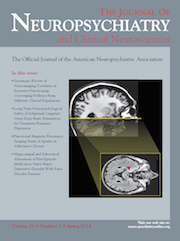Rapid Responses of High-Dose Combined Therapy of Escitalopram and Aripiprazole in a Case of Severe Obsessive Compulsive Disorder With Delusion
To the Editor: The standard treatment of obsessive compulsive disorder (OCD) usually means antidepressants.1 A low dose of antipsychotic can be an option of augmentation therapy for treatment-resistant OCD. We want share the experience of a severe OCD patient with delusion, who had rapid response after combination of high-dose escitalopram and aripiprazole for 2 weeks.
Case Report
Miss H is a 24-year-old woman with severe OCD for 6–7 months. Her symptoms included intrusive thoughts of being raped, having her underwear stolen, and repetitively asking others about these questions. The global severity rating score of the New Jersey Center for Tourette Syndrome (NJCTS) Dimensional Yale-Brown Obsessive Compulsive Scale (DYBOCS) was 25 (instrumental range: 0–30). She received several antidepressants for OCD symptoms in recent 6 months, such as sertraline 150 mg/day, or citalopram 60 mg/day, or venlafaxine 225 mg/day. However, the clinical response were limited (DYBOCS scores: 21) under this treatment. Furthermore, she had delusions of being raped and kidnapped since the last month of her OCD treatment. Under the impression of severe OCD and a possible progression to delusion, her medications were switched to escitalopram 40 mg/day and aripiprazole 20 mg/day during hospitalization. The OCD symptoms and delusion still remained (DYBOCS scores: 18) after 1 week of treatment. The dose of aripiprazole, therefore, was increased to 30 mg/day, and her OCD with delusion significantly improved in the following week (DYBOCS scores: 11). Sedation and blurred vision side effects were mentioned. However, because OCD symptoms with delusion improved significantly, she was discharged.
Discussion
Recently, several studies investigated the augmentation role of aripiprazole with serotonergic antidepressant for the treatment of OCD and showed the potential of therapeutic effects.2–5 However, the in these studies the dose range was 10–20 mg/day, which is not the same as the high dose in this case. In the recent two double double-blind studies, aripiprazole 10 or 15 mg/day with serotonergic antidepressants substantially relieved OCD symptoms in 12–16 weeks.4,5 Serotonin 5-HT2A antagonism and dopamine D2 partial agonism of aripiprazole can restore lower 5-HT2A receptor availability over frontal cortex and D2 receptor uptake over basal ganglion in medication-naïve OCD patients.6 D2 partial agonism, serotonin 5-HT1A partial agonism, and serotonin 5-HT2C functional antagonism action of aripiprazole would enhance dopamine release in prefrontal cortex through activation of serotonin action over nucleus accumbens.7–9 The prefrontal cortex dopamine activity could modulate basal ganglion dopamine system through top-down mechanism10 and, thus, the OCD symptoms with delusion would be relieved through serotonin-dopamine systems modulation. The successful experience in this patient with severe OCD and delusion might also be related to extrastriatal modulation toward striatal D2 receptors.11 The combined therapy of high-dose escitalopram and aripiprazole might benefit from enhancing effects of serotonin from D2, 5-HT1A, and 5-HT2C characteristics of aripiprazole. Furthermore, aripiprazole might modulate the dopamine system to relieve the comorbid delusion and obsessive ideas in this patient. According to our experience in this patient, the high-dose aripiprazole and escitalopram might be an alternative choice if we need to decrease the OCD symptoms with delusion very rapidly.
1 :
2 : Antipsychotic augmentation of serotonin reuptake inhibitors in treatment-resistant obsessive-compulsive disorder: a meta-analysis of double-blind, randomized, placebo-controlled trials. Int J Neuropsychopharmacol 2013; 16:557–574Crossref, Medline, Google Scholar
3 : Aripiprazole treatment in an adolescent patient with chronic motor tic disorder and treatment-resistant obsessive-compulsive disorder. Int J Neuropsychopharmacol 2009; 12:1291–1293Crossref, Medline, Google Scholar
4 : Effect of aripiprazole augmentation of serotonin reuptake inhibitors or clomipramine in treatment-resistant obsessive-compulsive disorder: a double-blind, placebo-controlled study. J Clin Psychopharmacol 2011; 31:174–179Crossref, Medline, Google Scholar
5 : Effects of aripiprazole augmentation in treatment-resistant obsessive-compulsive disorder (a double blind clinical trial). Depress Anxiety 2012; 29:850–854Crossref, Medline, Google Scholar
6 : In vivo PET study of 5HT(2A) serotonin and D(2) dopamine dysfunction in drug-naive obsessive-compulsive disorder. Neuroimage 2008; 42:306–314Crossref, Medline, Google Scholar
7 : Interactions of the novel antipsychotic aripiprazole (OPC-14597) with dopamine and serotonin receptor subtypes. Neuropsychopharmacology 1999; 20:612–627Crossref, Medline, Google Scholar
8 : Contributions of 5-HT(2C) receptors to multiple actions of central serotonin systems. Eur J Pharmacol 2004; 488:1–9Crossref, Medline, Google Scholar
9 : Aripiprazole in the treatment of depressive and anxiety disorders: a review of current evidence. CNS Drugs 2008; 22:367–388Crossref, Medline, Google Scholar
10 : Aripiprazole in a case presenting with Tourette syndrome and obsessive-compulsive disorder. J Clin Psychopharmacol 2008; 28:452–454Crossref, Medline, Google Scholar
11 : Dopamine D2 and D3 receptor occupancy in normal humans treated with the antipsychotic drug aripiprazole (OPC 14597): a study using positron emission tomography and [11C]raclopride. Neuropsychopharmacology 2002; 27:248–259Crossref, Medline, Google Scholar



